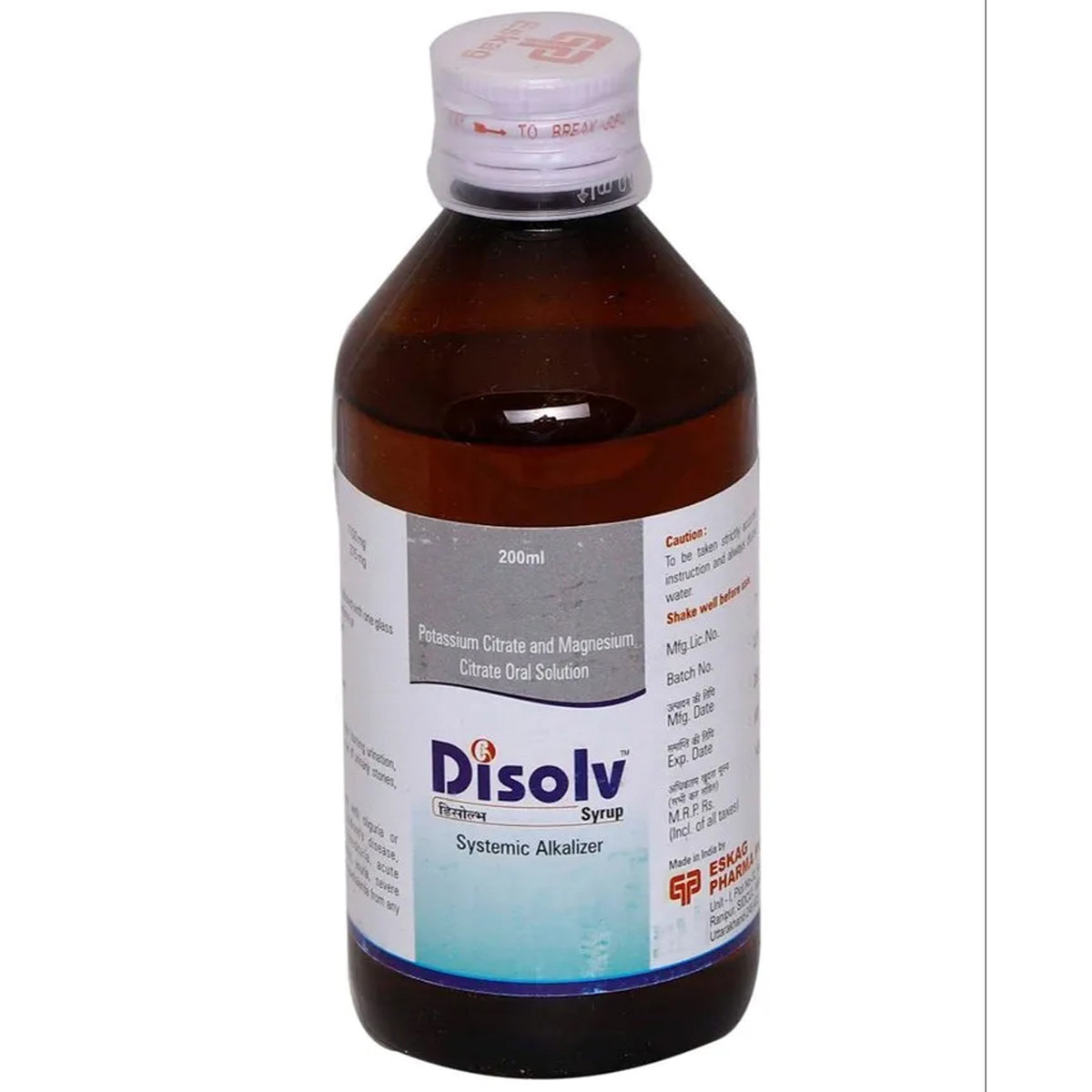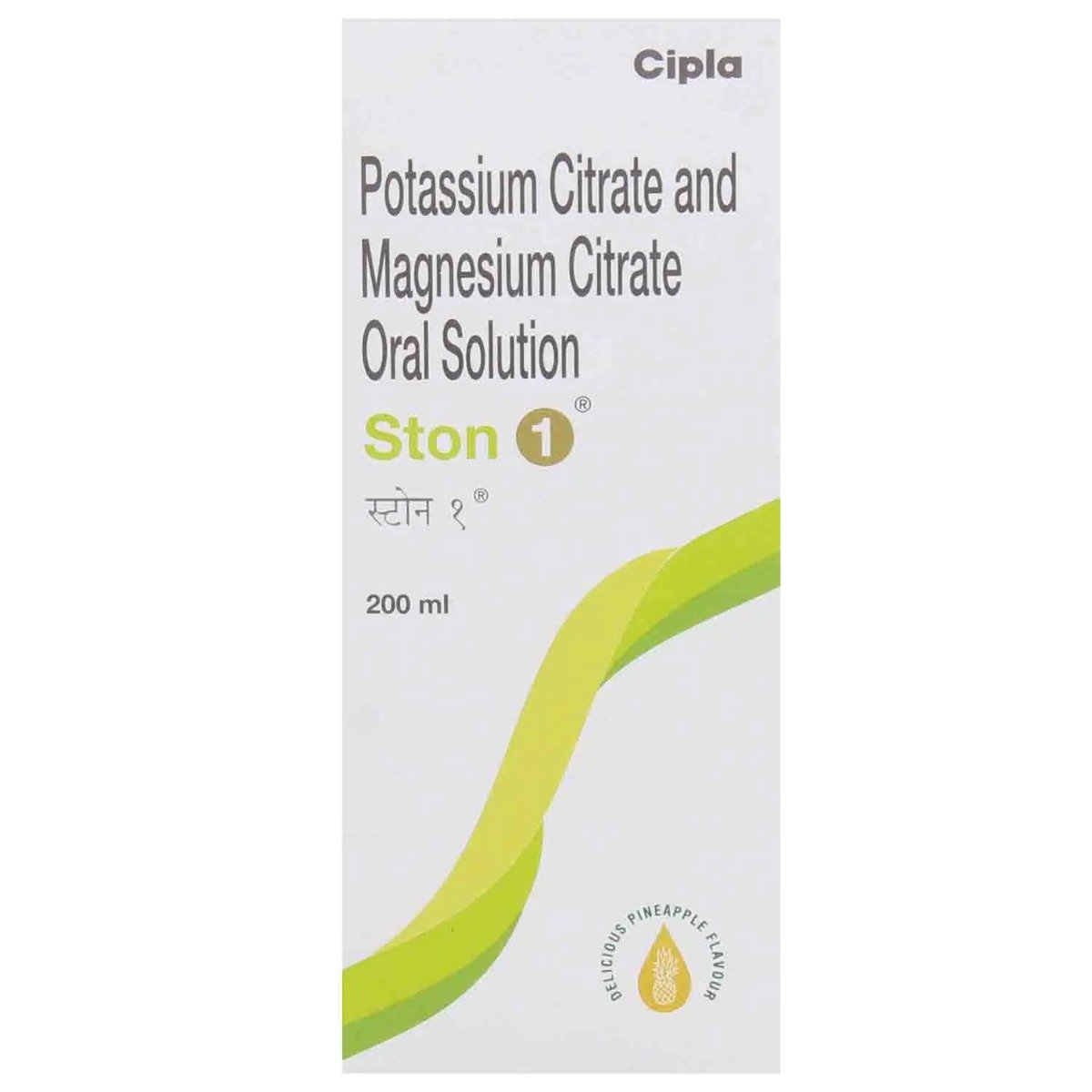Disolv Syrup 200 ml
MRP ₹135.5
(Inclusive of all Taxes)
₹20.3 Cashback (15%)
About Disolv Syrup
Disolv Syrup is indicated for the treatment of renal tubular acidosis and kidney stones due to low citric acid levels or high uric acid. Kidney stones are small, hard deposits made up of calcium, phosphate and other minerals/acid salts that stick together in concentrated urine. Renal tubular acidosis is a condition in which the kidneys fail to excrete acids into the urine, this causes the blood to remain too acidic.
Disolv Syrup is a combination of two drugs, namely: Magnesium citrate and Potassium citrate. Disolv Syrup raises the urinary pH, potassium, magnesium and citric acid levels; this prevents the crystallisation, growth and accumulation of stone-forming salts.
You are advised to take Disolv Syrup for as long as your doctor has prescribed it for you, depending on your medical condition. In some cases, you may experience certain common side effects such as abdominal discomfort, diarrhoea, nausea, and vomiting. Most of these side effects do not require medical attention and will resolve gradually over time. However, you are advised to talk to your doctor if you experience these side effects persistently.
Consult your doctor before taking Disolv Syrup if you are pregnant or breastfeeding. Disolv Syrup is not recommended for children as safety and effectiveness have not been established. It is not known if alcohol interacts with Disolv Syrup , so please consult a doctor. Keep your doctor informed about your health condition and medicines to rule out any side effects.
Country of origin
Manufacturer/Marketer address
Online payment accepted

secured payment

india's most trusted pharmacy

genuine products
Composition :
Manufacturer/Marketer :
Consume Type :
Expires on or after :
Return Policy :
Provide Delivery Location
About Disolv Syrup
Disolv Syrup is indicated for the treatment of renal tubular acidosis and kidney stones due to low citric acid levels or high uric acid. Kidney stones are small, hard deposits made up of calcium, phosphate and other minerals/acid salts that stick together in concentrated urine. Renal tubular acidosis is a condition in which the kidneys fail to excrete acids into the urine, this causes the blood to remain too acidic.
Disolv Syrup is a combination of two drugs, namely: Magnesium citrate and Potassium citrate. Disolv Syrup raises the urinary pH, potassium, magnesium and citric acid levels; this prevents the crystallisation, growth and accumulation of stone-forming salts.
You are advised to take Disolv Syrup for as long as your doctor has prescribed it for you, depending on your medical condition. In some cases, you may experience certain common side effects such as abdominal discomfort, diarrhoea, nausea, and vomiting. Most of these side effects do not require medical attention and will resolve gradually over time. However, you are advised to talk to your doctor if you experience these side effects persistently.
Consult your doctor before taking Disolv Syrup if you are pregnant or breastfeeding. Disolv Syrup is not recommended for children as safety and effectiveness have not been established. It is not known if alcohol interacts with Disolv Syrup , so please consult a doctor. Keep your doctor informed about your health condition and medicines to rule out any side effects.
Uses of Disolv Syrup
Key Benefits
Disolv Syrup is a combination of two drugs, namely: Magnesium citrate and Potassium citrate. Disolv Syrup is indicated for the treatment of renal tubular acidosis with calcium stones, uric acid lithiasis with or without calcium stone, hypocitraturic calcium oxalate nephrolithiasis (kidney stones). Disolv Syrup raises the urinary pH, potassium, magnesium and citric acid levels; this prevents the crystallisation, growth and accumulation of stone-forming salts.
Directions for Use
Storage
Side Effects of Disolv Syrup
- Abdominal discomfort
- Diarrhoea
- Vomiting
- Nausea
Drug Warnings
Do not take Disolv Syrup if you are allergic to any of its components; if you have hyperkalaemia (high levels of potassium), delayed gastric emptying, intestinal obstruction, peptic ulcers, urinary tract infection, or renal insufficiency. Inform your doctor if you have gastrointestinal lesions. If you experience severe vomiting, gastrointestinal bleeding or abdominal pain, stop taking Disolv Syrup and consult a doctor immediately. Disolv Syrup is not recommended for children as safety and effectiveness have not been established. Consult your doctor before taking Disolv Syrup if you are pregnant or breastfeeding.
Drug Interactions
Drug-Drug Interactions: Disolv Syrup may interact with diuretics (triamterene, spironolactone, amiloride) and anticholinergic drugs.
Drug-Food Interactions: No interactions found/established.
Drug-Disease Interactions: Inform your doctor if you have hyperkalaemia (high levels of potassium), delayed gastric emptying, intestinal obstruction, peptic ulcers, urinary tract infection, or renal insufficiency.
Drug-Drug Interactions Checker List
- TRIAMTERENE
- SPIRONOLACTONE
- AMILORIDE
Habit Forming
Diet & Lifestyle Advise
- Drink plenty of fluids as they help in flushing out excess minerals.
- Limit salt intake. High amounts of salt can increase the risk of kidney stones.
- Maintain a healthy weight by exercising regularly.
- Avoid foods rich in oxalates such as spinach, nuts, okra, dates, avocado, hot chocolate, cocoa, baked potato, french fries, and cereals as they might increase the risk of oxalate stones.
- Try maintaining optimum levels of calcium in the body as too little or high calcium can lead to kidney stones.
Disease/Condition Glossary
Kidney stones: Nephrolithiasis, also known as kidney stones, is a disease affecting the urinary tract. Kidney stones are small, hard deposits made up of calcium, phosphate and other minerals/acid salts that stick together in concentrated urine. They are the common cause of blood in urine and can be painful when passing through the urinary tract. Symptoms include severe pain, usually in one side of the abdomen and nausea.
Renal tubular acidosis: It is a condition that involves the accumulation of acid in the body due to the failure of the kidneys to acidify the urine appropriately. The kidneys fail to excrete acids into the urine, which causes the blood to remain too acidic. If not treated, it could lead to kidney stones, bone disease, kidney disease or failure.
FAQs
Disclaimer
Alcohol
Safe if prescribed
It is not known if alcohol interacts with Disolv Syrup . Please consult a doctor.
Pregnancy
Consult your doctor
Disolv Syrup belongs to pregnancy category C. Please consult your doctor if you have any concerns regarding this; your doctor will prescribe only if the benefits outweigh the risks.
Breast Feeding
Consult your doctor
Consult your doctor before taking Disolv Syrup ; your doctor will decide whether Disolv Syrup can be taken by breastfeeding mothers or not.
Driving
Safe if prescribed
Disolv Syrup is unlikely to affect your ability to drive. However, you are advised to drive only if you are alert.
Liver
Consult your doctor
Limited information is available regarding the usage of Disolv Syrup in patients with hepatic impairment. Please consult your doctor.
Kidney
Consult your doctor
Disolv Syrup might cause soft tissue calcification and hyperkalaemia in patients with renal insufficiency. Please consult your doctor if you have kidney impairment or any concerns regarding this.
Children
Safe if prescribed
The safety and effectiveness of Disolv Syrup in children have not been established.
Author Details
We provide you with authentic, trustworthy and relevant information
Uses of Disolv Syrup
Key Benefits
Disolv Syrup is a combination of two drugs, namely: Magnesium citrate and Potassium citrate. Disolv Syrup is indicated for the treatment of renal tubular acidosis with calcium stones, uric acid lithiasis with or without calcium stone, hypocitraturic calcium oxalate nephrolithiasis (kidney stones). Disolv Syrup raises the urinary pH, potassium, magnesium and citric acid levels; this prevents the crystallisation, growth and accumulation of stone-forming salts.
- Drink water or other clear fluids.
- To prevent worsening of pain, limit intake of tea, coffee, or alcohol.
- Include bland foods like rice, toast, crackers, and rice in your diet.
- Avoid lying down immediately after eating as it may cause indigestion or heartburn.
- Avoid acidic and spicy food as it may cause indigestion.
- Preventing Vomiting (Before it Happens)
- Take medication exactly as prescribed by your doctor. This can help minimize side effects, including vomiting.
- Having a small meal before taking your medication can help reduce nausea and vomiting.
- Talk to your doctor about taking anti-nausea medication along with your prescribed medication.
- Managing Vomiting (If it Happens)
- Try taking ginger in the form of tea, ale, or candy to help alleviate nausea and vomiting.
- What to Do if Vomiting Persists
- Consult your doctor if vomiting continues or worsens, consult the doctor for guidance on adjusting your medication or additional treatment.
- Inform Your Doctor: Notify your doctor immediately about your diarrhoea symptoms. This allows them to adjust your medication or provide guidance on managing side effects.
- Stay Hydrated: Drink plenty of fluids to replace lost water and electrolytes. Choose water, clear broth, and electrolyte-rich drinks. Avoid carbonated or caffeinated beverages to effectively rehydrate your body.
- Follow a Bland Diet: Eat easy-to-digest foods to help firm up your stool and settle your stomach. Try incorporating bananas, rice, applesauce, toast, plain crackers, and boiled vegetables into your diet.
- Avoid Trigger Foods: Steer clear of foods that can worsen diarrhoea, such as spicy, fatty, or greasy foods, high-fibre foods, and dairy products (especially if you're lactose intolerant).
- Practice Good Hygiene: Maintain good hygiene to prevent the spread of infection. To stay healthy, wash your hands frequently, clean and disinfect surfaces regularly, and avoid exchanging personal belongings with others.
- Take Anti-Diarrheal Medications: If your doctor advises, anti-diarrheal medications such as loperamide might help manage diarrhoea symptoms. Always follow your doctor's directions.
- Keep track of your diarrhoea symptoms. If they don't get better or worse or are accompanied by severe stomach pain, blood, or dehydration signs (like extreme thirst or dark urine), seek medical help.
- Limit fruit intake to two servings a day, choose a low-potassium options like apples and strawberries.
- Restrict starchy vegetables like potatoes and pumpkin to half a cup daily.
- Avoid or limit foods like tomato products, high-bran cereals, and salty or sugary snacks.
- Limit dairy products to 200g of yoghurt or 300ml of milk per day.
Directions for Use
Storage
Drug Warnings
Do not take Disolv Syrup if you are allergic to any of its components; if you have hyperkalaemia (high levels of potassium), delayed gastric emptying, intestinal obstruction, peptic ulcers, urinary tract infection, or renal insufficiency. Inform your doctor if you have gastrointestinal lesions. If you experience severe vomiting, gastrointestinal bleeding or abdominal pain, stop taking Disolv Syrup and consult a doctor immediately. Disolv Syrup is not recommended for children as safety and effectiveness have not been established. Consult your doctor before taking Disolv Syrup if you are pregnant or breastfeeding.
Therapeutic Class
Drug-Drug Interactions
Drug-Drug Interactions
Login/Sign Up
Taking Clemastine and Disolv Syrup 200 ml (in tablet or capsule form) together can increase the risk of stomach ulcers, bleeding, and other gastrointestinal injury.
How to manage the interaction:
Taking Clemastine with Disolv Syrup 200 ml is not recommended, as it may lead to an interaction but can be taken if prescribed by the doctor. However, if you experience severe stomach pain, bloating, sudden lightheadedness or dizziness, nausea, vomiting (especially with blood), decreased hunger, or dark, tarry stools, consult the doctor immediately. Do not discontinue any medications without a doctor's advice.
Taking Orphenadrine and Disolv Syrup 200 ml (in tablet or capsule form) together can increase the risk of stomach ulcers, bleeding, and gastrointestinal injury.
How to manage the interaction:
Taking Orphenadrine (citrate) with Disolv Syrup 200 ml is not recommended, as it may lead to an interaction, it can be taken if prescribed by the doctor. However, if you experience severe stomach pain, bloating, sudden lightheadedness or dizziness, nausea, vomiting (especially with blood), decreased hunger, or dark, tarry stools, consult the doctor immediately. Do not discontinue any medications without a doctor's advice.
Taking Disolv Syrup 200 ml and trospium together can increase the risk of stomach ulcers, bleeding, and gastrointestinal injury.
How to manage the interaction:
Taking Trospium with Disolv Syrup 200 ml is not recommended as it may lead to an interaction, it can be taken if prescribed by the doctor. However, if you experience severe stomach pain, bloating, sudden lightheadedness or dizziness, nausea, vomiting (especially with blood), decreased hunger, or dark, tarry stools, consult the doctor immediately. Do not discontinue any medications without a doctor's advice.
Co-administration of Glycopyrrolate with Disolv Syrup 200 ml can increase the risk or severity of ulcers, bleeding, and other gastrointestinal injury.
How to manage the interaction:
Taking Glycopyrrolate with Disolv Syrup 200 ml together is not recommended as it can result in an interaction, it can be taken if a doctor has advised it. However, if you experience severe abdominal pain, bloating, sudden dizziness or lightheadedness, nausea, vomiting (especially with blood), loss of appetite, and/or black, tarry stools, contact a doctor immediately. Do not discontinue any medications without consulting a doctor.
Taking Procyclidine and Disolv Syrup 200 ml together can increase the risk of stomach ulcers, bleeding, and gastrointestinal injury.
How to manage the interaction:
Taking procyclidine with Disolv Syrup 200 ml is not recommended, but it can be taken together if advised by your doctor. However, if you experience severe stomach pain, bloating, sudden lightheadedness or dizziness, nausea, vomiting (especially with blood), decreased hunger, or dark, tarry stools, consult the doctor immediately. Do not discontinue any medications without a doctor's advice.
Taking Cyproheptadine and Disolv Syrup 200 ml (in tablet or capsule form) together can increase the risk of stomach ulcers.
How to manage the interaction:
Taking Cyproheptadine with Disolv Syrup 200 ml is not recommended, as it may lead to an interaction but can be taken if prescribed by the doctor. However, if you experience severe stomach pain, bloating, sudden lightheadedness or dizziness, nausea, vomiting (especially with blood), decreased hunger, or dark, tarry stools, consult the doctor immediately. Do not discontinue any medications without a doctor's advice.
Taking Disopyramide and Disolv Syrup 200 ml together can increase the risk of stomach ulcers, bleeding, and gastrointestinal injury.
How to manage the interaction:
Although taking Disopyramide and Disolv Syrup 200 ml together is not recommended as it may lead to an interaction, it can be taken if prescribed by the doctor. However, if you experience severe stomach pain, bloating, sudden lightheadedness or dizziness, nausea, vomiting (especially with blood), decreased hunger, or dark, tarry stools, consult the doctor immediately. Do not discontinue any medications without a doctor's advice.
Coadministration of Oxybutynin and Disolv Syrup 200 ml can increase the risk of developing stomach ulcers or bleeding.
How to manage the interaction:
Taking Oxybutynin with Disolv Syrup 200 ml is generally avoided as it may lead to an interaction, it can be taken if prescribed by the doctor. Consult the doctor immediately if you experience severe stomach pain, bloating, lightheadedness, dizziness, vomiting (especially with blood), decreased hunger, or dark stools. Do not discontinue any medications without a doctor's advice.
Taking Biperiden and Disolv Syrup 200 ml (in tablet or capsule form) together can increase the risk of stomach ulcers, bleeding, and other gastrointestinal injury.
How to manage the interaction:
Taking Biperiden with Disolv Syrup 200 ml is not recommended, as it may lead to an interaction but can be taken if prescribed by the doctor. However, if you experience severe stomach pain, bloating, sudden lightheadedness or dizziness, nausea, vomiting (especially with blood), decreased hunger, or dark, tarry stools, consult the doctor immediately.
Taking Dicyclomine and Disolv Syrup 200 ml together can increase the risk of stomach ulcers, bleeding, and gastrointestinal injury.
How to manage the interaction:
Taking Dicyclomine with Disolv Syrup 200 ml is not recommended, as it may lead to an interaction, it can be taken if prescribed by the doctor. However, if you experience severe stomach pain, bloating, sudden lightheadedness or dizziness, nausea, vomiting (especially with blood), decreased hunger, or dark, tarry stools, consult the doctor immediately. Do not discontinue any medications without a doctor's advice.
Drug-Drug Interactions Checker List
- TRIAMTERENE
- SPIRONOLACTONE
- AMILORIDE
Diet & Lifestyle Advise
- Drink plenty of fluids as they help in flushing out excess minerals.
- Limit salt intake. High amounts of salt can increase the risk of kidney stones.
- Maintain a healthy weight by exercising regularly.
- Avoid foods rich in oxalates such as spinach, nuts, okra, dates, avocado, hot chocolate, cocoa, baked potato, french fries, and cereals as they might increase the risk of oxalate stones.
- Try maintaining optimum levels of calcium in the body as too little or high calcium can lead to kidney stones.
Habit Forming
Side Effects of Disolv Syrup
- Abdominal discomfort
- Diarrhoea
- Vomiting
- Nausea
Disease/Condition Glossary
Kidney stones: Nephrolithiasis, also known as kidney stones, is a disease affecting the urinary tract. Kidney stones are small, hard deposits made up of calcium, phosphate and other minerals/acid salts that stick together in concentrated urine. They are the common cause of blood in urine and can be painful when passing through the urinary tract. Symptoms include severe pain, usually in one side of the abdomen and nausea.
Renal tubular acidosis: It is a condition that involves the accumulation of acid in the body due to the failure of the kidneys to acidify the urine appropriately. The kidneys fail to excrete acids into the urine, which causes the blood to remain too acidic. If not treated, it could lead to kidney stones, bone disease, kidney disease or failure.
All Substitutes & Brand Comparisons
RX
Out of StockUtimack Syrup
₹149
(₹0.67/ 1ml)
9% COSTLIERRX
K-2 Syrup 200 ml
Simon Pharmchem
₹160
(₹0.72/ 1ml)
18% COSTLIERRX
Out of StockMD Pot Syrup 200 ml
Mdc Pharmaceuticals Pvt Ltd
₹169
(₹0.76/ 1ml)
24% COSTLIER

Have a query?
















_0.jpg?tr=q-85)



